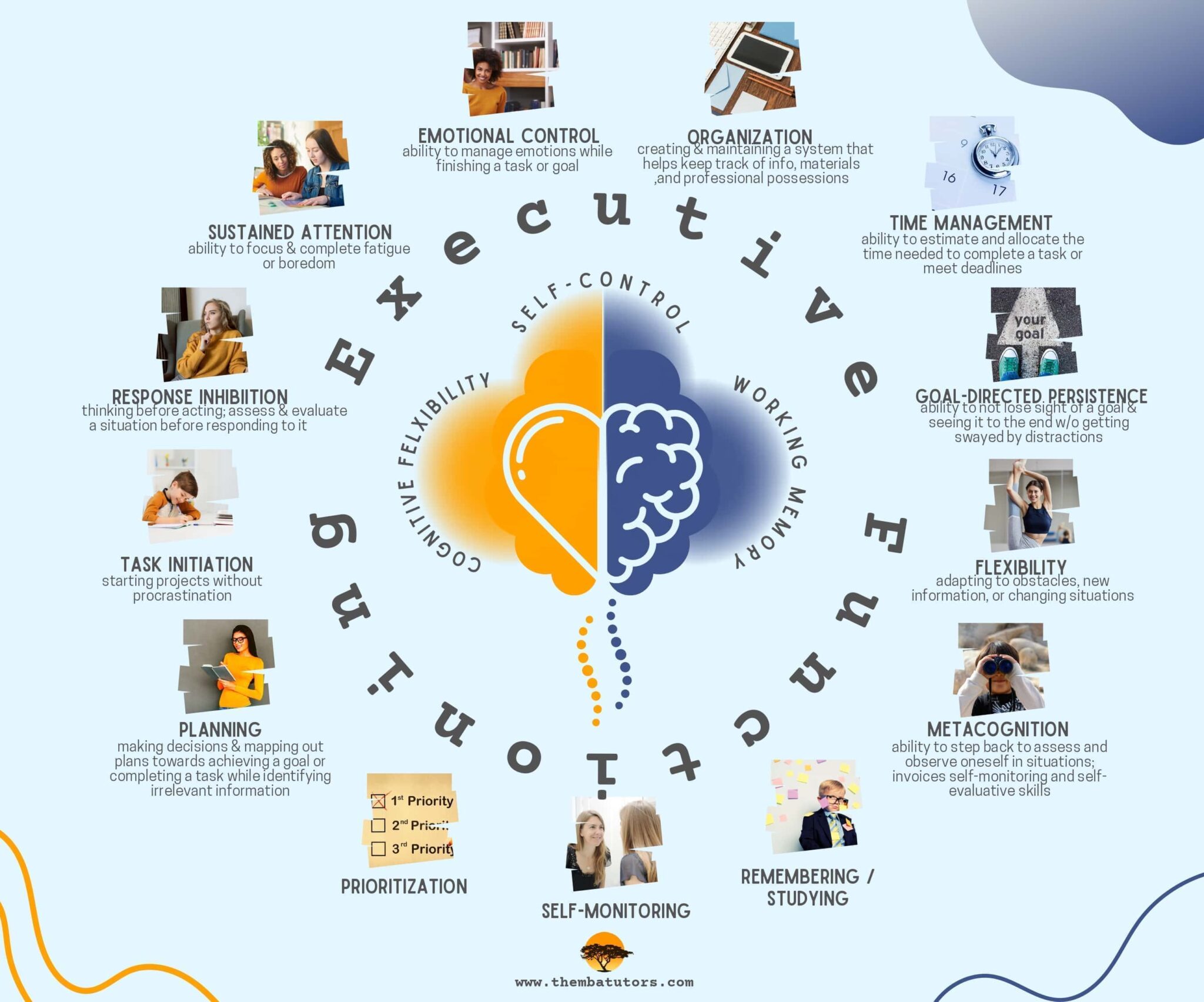
27 Jun Signs and Symptoms of Executive Function Disorder
Do You Have Trouble Focusing or Deciding?
SIGNS YOU MAY HAVE EXECUTIVE FUNCTION DISORDER

Signs and Symptoms of Executive Function Disorder
Have you ever felt like your brain won’t cooperate? You know what needs to get done but struggle to do it. You may have trouble focusing or making decisions. If this sounds familiar, you could deal with an executive function disorder.
Executive function refers to the mental processes that enable us to plan, focus attention, remember instructions, and juggle multiple tasks successfully. We rely on executive function for everything from making breakfast in the morning to completing important work projects. Even small tasks can feel overwhelming and exhausting if your executive function needs to be fixed.
The good news is there are strategies you can use to strengthen your executive function. We’ll explore what executive function disorder looks like and provide tips to help improve focus, planning, and decision-making. You don’t have to feel stuck – you can outsmart your uncooperative brain with the right tools and techniques.
What Is Executive Function Disorder and How Does It Affect You?
Executive function disorder makes it hard to focus, plan, and decide. You may have this condition if you struggle with these skills that most people take for granted.
- Trouble focusing or switching between tasks. Do you find your mind wandering or distracted easily? Do you need help shifting gears when needed? These are signs of poor focus and cognitive flexibility, hallmarks of executive dysfunction.
- Difficulty planning and prioritizing. Do you feel overwhelmed by complex tasks and need help figuring out where to start? Do you need help estimating how long things will take or laying out steps logically? Problems with planning and organization are common with this disorder.
- Challenges in making decisions. Are choices paralyzing for you? Do you agonize over even small decisions or doubt yourself after making one? The inability to weigh options efficiently and choose an action is linked to executive function difficulties.
- Time blindness. Do you frequently need to catch up on time or underestimate how long things will take? Struggling with time management and awareness is associated with executive function challenges.
If these issues sound familiar, you may have executive function disorder. The good news is treatment options like cognitive behavioral therapy, mindfulness, and medication can help strengthen your executive skills and make daily life easier to navigate. Consult with your doctor about strategies and resources for coping with this condition.
Common Signs and Symptoms of Executive Function Disorder
You could have executive function disorder if you struggle with focus, planning, and decision-making daily. Some common signs include:
- Trouble prioritizing tasks or managing time. You need help figuring out what needs to get done first and estimating how long things will take. Your to-do list seems overwhelming, and you need to be more organized.
- Difficulty starting or stopping tasks. It takes a lot of work to take the first step to get going on something or shift gears to a new activity. You tend to procrastinate, even for things you want to do.
- Problems with working memory. You need help remembering details or multitasking. You may frequently lose or misplace things, forget appointments or commitments, or repeat the same stories to the same people.
- Impulsiveness or poor decision-making. You act without thinking or have trouble weighing options logically. As a result, you often feel regret over the choices you’ve made.
- Trouble adapting to change. You prefer routine and familiarity. New situations stress you out and sap your motivation or productivity. Transitioning from one activity to another can be particularly difficult.
The good news is some strategies and treatments can help. Talking to your doctor or a trusted mental health professional is the first move to getting the support you need and learning skills to manage your symptoms better. You don’t have to deal with executive function problems alone.

Strategies to Help Improve Your Executive Function Skills
➡ Set a Routine
Establishing a consistent routine can minimize distractions and support better focus and decision-making. Try to go to bed and wake up simultaneously each day, even on weekends. Eat meals at regular times too. A predictable structure frees up your mental resources to concentrate on important tasks better.
➡ Minimize Distractions
Turn off notifications on your devices and limit checking email or social media. Find a place free of interruptions to work or study. Let people around you know that you do not want to be disturbed. Wearing noise-canceling headphones can also help block out auditory distractions.
➡ Make To-Do Lists
Break down big tasks into smaller, concrete steps. Prioritize what needs to get done and tackle items one by one. Checking completed tasks off the list gives you a sense of progress and motivation to keep going. Review your list regularly and re-prioritize as needed.
➡ Take Frequent Breaks
It may seem counterintuitive, but taking some short breaks can help rejuvenate your mind and body, making you more focused when you resume work. Even taking short walking breaks can help. Step away from your tasks for 10-15 minutes every 90 minutes. Do some light exercise like stretching, or make a snack. The brief respite will help you feel less drained and better able to concentrate.
➡ Ask for Help When You Need It
Feel free to ask others for input or advice, especially for big decisions. Getting another perspective can help clarify and allow you to consider options you may have overlooked. Let people close to you know if you struggle with focusing or decision-making. Their support can help keep you accountable and encourage progress.
Conclusion
If you need help to focus, prioritize, get organized, or make decisions, you may have some challenges with your executive functioning. The good news is there are techniques and habits you can implement to strengthen these skills. Start by minimizing distractions, creating routines and schedules, using timers to keep yourself on task, and learning organizational techniques like categorizing and filing.
In decision-making, weigh the pros and cons, get input from others, and go with what feels right for you. You’ve got this! With practice and patience, you can overcome executive function difficulties and become the focused, productive person you aspire to be. The key is being kind to yourself along the way. You’re not alone in this, and there is help and hope. Stay determined and keep working at it every day. You will get there!
Craig Selinger
Latest posts by Craig Selinger (see all)
- Psychotherapy and Support Services at Cope With School NYC - April 12, 2024
- NYC Parents of Teens Support Group - April 8, 2024
- Here I Am, I Am Me: An Illustrated Guide to Mental Health - April 4, 2024


No Comments